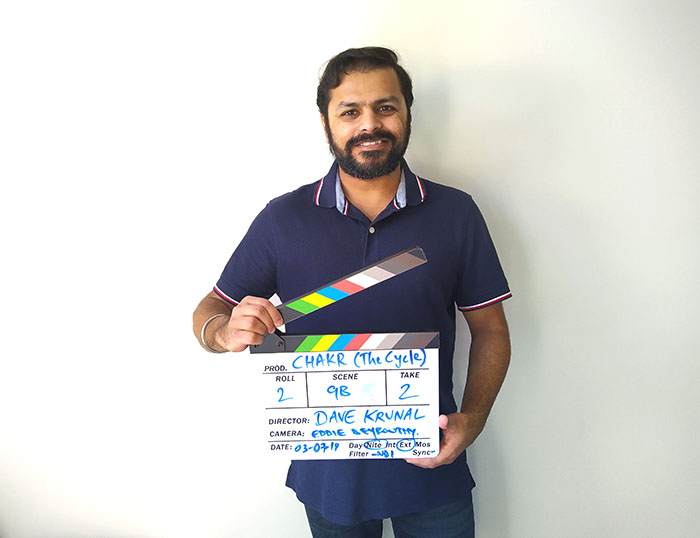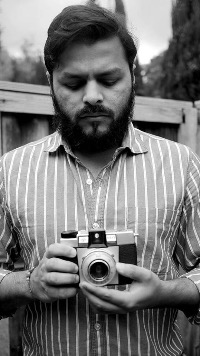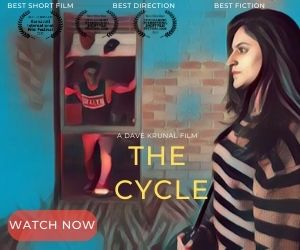
Film Courage: Where did you grow up?
Dave Krunal, Filmmaker: I grew up mostly in Ahmedabad city, Gujarat, India.
I was raised in a joint family as my father and uncle were living together. Life at home was vibrant and often chaotic due to frequent social gatherings with family relatives. I cannot recall one weekend without guests. The best thing was the celebration of food and festivals. However, growing up in a small house with a younger sister and surrounded by people all the time, I often wanted to escape out of the house and play with friends.
Film Courage: Did your parents lend support toward creativity?
Dave: My parents and Uncle-Auntie have always encouraged me, especially they never compromised with my quality of education. My father was a government employee, and his job had frequent movement within the rural part of the Gujarat state. We relocated a couple of times in the small town. However, we moved back to the city as he (my father) chose to travel long distance so that the family could live in the urban town and we (me and my sister) can go to the best school.
Film Courage: What was it like to be the new kid in school?
Dave: As I mentioned, due to my father’s transferable job, I was always the new kid throughout my school years. We moved from the city to a rural town a couple of times. It was still hard to get back to the same school in the city, and I had to take admission to another school during the waiting period. Due to this, every couple of years, I used to make new friends and lose them. It was troublesome to create a new environment adaptable and abandon as soon as it became comfortable. This pattern took the negative compound effect when I was in year 12. Suddenly, I realized that I had not even one good friend with whom I can study or share my feelings. It was hard to gel up as everybody had formed their groups. I became reserved and started suppressing my emotions in public.

“I think the best improvisation happens on shooting day either due to limitation or spot-on creativity from cast or crew. When I compare the final shooting script with film, a lot has changed. That’s the best part. I enjoy all the aspects of filmmaking more than my end product.”
Film Courage: Did you go to film school?
Dave: No. Film Schools are expensive, and you only learn theory. I learned movie making from watching films, reading scripts and making my short films. However, I did attend a 3-month film course in Melbourne to learn the fundamentals in 2012. It was a great experience to meet like-minded people. We made a crime drama student film called “Blessed” where I co-directed the first scene of the film. After the course, I picked a few fellow aspiring filmmakers and made my first mystery thriller short film Curious.
Film Courage: What movie should be mandatory viewing at all film schools?
Dave: That would be Sir Alfred Hitchcock’s 1954 Rear Window.
Rear Window is a classic example of low-budget filmmaking with great visual storytelling, minimal dialogues and one-set location. Also, the narration is from the protagonist’s perspective. It teaches a lot about point-of-view (POV) cinema. Sir Alfred Hitchcock’s style has profoundly influenced me. My debut short film Curious had no dialogue. My recent film, The Cycle also tells the story from the protagonist’s point of view.
Film Courage: What inspired the story for your new movie Gujarati “ચક્ર” (THE CYCLE)?
Dave: I have been strictly maintaining minimal location and cast in all my films. That’s the key to save money and time. So, I had an idea to make a film from a taxi driver’s perspective for a long time where the majority of the film would require shooting inside the car. But, it was a hollow idea without a plot.
I tend to make films on ideas that either disturb or inspire me at a deeper level. One such painful event was when I witnessed domestic violence in my neighborhood. It made me feel sick. I reported the incident to local crime stoppers, and they started asking detailed questions I could not answer. It was after the call I had a bizarre idea of the time-travel – What if there was a murder? What if I go back in time and witness the event and save the victim?
I pulled out my taxi driver character who had no motive to merge with time-travel idea, who would witness this event with his passenger. And out of all of this, Chakr (The Cycle) was born.
Film Courage: Did you come up with a film budget first (based on your resources available) before coming up with the idea? Or was it the other way around?
Dave: The first lesson I learned the hard way in my filmmaking journey is to write an idea first and think about the budget. When I wrote my first film Curious in 2013, money was nowhere in my mind. It was after the post-production I realized that I spent too much money on special effects. Also, I submitted Curious to the whole bunch of film festivals around the world without a clear strategy. These are the expensive lesson that I would never repeat.
Film Courage: How did you calculate what the budget was going to be, and what was the final budget?
Dave: My initial budget was $3k. However, I had to spend another $2k for the sound production I didn’t plan at the beginning. My strategy included traveling to Los Angeles to attend the International Gujarati Film Festival (IGFF). Therefore, after adding traveling, film festival and marketing cost, I think it has almost reached to $10k.
Film Courage: How long was the idea floating around in your head before you started writing THE CYCLE?
Dave: For all my films, it starts with a small seed and then with time and inspirations from various soundtracks, reading material and writing exercises, it evolves. The idea for The Cycle floated for more than a year before I sat down and write.
Film Courage: How long did it take you to write the first draft?
Dave: Because I stir my ideas for months and years into my mind, I write my draft within days. It took me just one day to write the first draft for The Cycle. In my terminology, I call it a creative vomit. However, there were six revisions before the shoot, and I keep my script open to improvise even on the shooting days. I think the best improvisation happens on shooting day either due to limitation or spot-on creativity from cast or crew. When I compare the final shooting script with film, a lot has changed. That’s the best part. I enjoy all the aspects of filmmaking more than my end product.
Film Courage: How many people did you share the script with during the writing process?
Dave: I don’t have a habit of sharing my script during the process. However, I am going to change this. I have made a few great connections with fellow filmmakers who are happy to provide genuine feedback.
Film Courage: How long have you been planning the film?
Dave: The thing with my writing is I start with a simple idea and make it complicated. Then I discover my way of storytelling to convey a complex idea most simply. It requires a lot of brainstorming. I spend months to scribble the flow as I consider my stories are plot-driven. Majority of the visual flow occurs when I go for a long drive in the car or walk. For my recent film, I knew time-travel stories are so familiar. But, I wanted to experiment with non-linear structure.
Film Courage: How did you pitch the script to your actors?
Dave: Before I pitch my actors, I write a one-page character summary and background story for them. It involves their past, core values and emotional memory. I told my lead protagonist that your character is about integrity, whether it’s a beautiful girl or 80-year older woman, you will do anything to save her life. Once my actors have the pre-conceived mindset of the character, I pitch the story individually and get their feedback. I repeat this process until my actor aligns with the script and character traits. In the end, I do a joint session with all the actors and pitch the story. This way, all the actors know the motive for others, and it helps them to elevate their character personality.

Film Courage: Where did you shoot the film/secure the locations?
Dave: The Cycle is the only film among others I made whose idea derived from the location. It’s funny that the real place for the film belongs to a vehicle. In my first draft, the main character had a Yellow Taxi. But, I didn’t find access to the real cab. Therefore, I used my car and changed the character into Uber driver. 70% of the shoot was inside my car. My house had a long pathway. So, I used that and an entrance to my house. However, the challenge was to find a location or road circuit for the moving car scenes. Also, we wanted to shoot in the night.
I spent nearly two months to find such a circuit, but Melbourne’s inner-city areas are dense. Also, I had to do guerrilla shooting, and there was no budget to block the roads and get a permit from the council. Finally, I found the closed-loop path where people appear for their driving test. The way was broad, and on the weekend, there was no one.
Film Courage: Did you face any unusual challenges during the production or post-production?
Dave: When I was struggling to find a location for moving car scenes, I decided to shoot with a green screen. We did some experiment, but the post-processing footage didn’t look real. So, I decided to shoot with the actual moving car to add realism. However, to pull out physically from the moving vehicle is the most challenging thing. Especially when you don’t have money for rigs and a “process trailer”. On the shoot day, the most unusual challenge was to accommodate cast and crew in the car. Apart from two actors, it was only cinematographer and me from the team. So, my DOP hides at the front bottom while I was in the boot with an external recorder. And the shoot went for nearly six hours.
Film Courage: What will you do differently next time?
Dave: I always thought first about visual aspects of the project such as camera, format and lens. However, next time I would like to think about sound production first. It’s one of the lessons I learned the hard way. As they said, people do forget the blurry image, but they never forget the terrible sound. Sound design is one of the areas I seek growth in the next project.
Film Courage: What camera(s) did you use? What lighting was used for the film?
Dave: The film was shot on Sony NEX-FS700 4K Super 35mm camcorder with Odyssey7Q+ external recorder. As we were dealing with tight space, we used Carl Zeiss Distagon 28mm f2 lens. I used my GoPro Hero 3+ for POV shots. I had to reshoot some close-ups with my Canon 5D Mark iii during the post-production. For lighting, I can’t recall the technical specs, but we predominantly used red color to depict danger inside the house. We didn’t have many alternatives to light the moving car scenes due to other challenges.
Film Courage: What was the most expensive part of making THE CYCLE?
Dave: It was time. Especially, to produce independent sound and foley was a nightmare and expensive. I was fortunate to discover an industry professional who took the sound department under his wing to rerecord dialogues and mixing. I still had to outsource foley work to Malaysia. As I mentioned, caring about sound in the pre-production saves a lot of time and cost in the post-production. It’s one of the filmmaking aspects that no filmmaker should ignore.
Film Courage: What will you settle for, and what do you refuse to settle for with your movies?
Dave: The settlement for me is the freedom to express my thoughts. For my film projects, it’s all about authenticity and core values. As long as I justify the world of story and characters that align with my belief, I don’t regret my decisions. Therefore, if I don’t believe the story or idea in the first place, I am not afraid to refuse it even though it has a monetary value. Because once you make a film, it stays in your soul forever. It’s imperative to tell the story that you have invested the emotions upon.
Film Courage: If a beginning filmmaker asked for your thoughts regarding challenges with indie filmmaking and self-distribution, what would you say?
Dave: It’s crucial to believe in your ideas even though it may sound weird to the world. Because what’s odd for the world, it’s unique for you. We are fortunate to live in this time where anyone can become a filmmaker and tell a story. Filmmaking is a skill that can be practiced, learned and mastered over time. However, it’s the talent and your unique style that takes a lifetime to discover.
For the movie production, you may find actors easily as there are many determined people out there. However, forming a technical crew is tough. Either you end up paying a lot of money when you hire professionals, or you get an amateur result if you do on your own. In that case, you still need to be a jack-of-all and learn everything that involves and wear multiple hats at the same time.
The distribution landscape has changed a lot in recent years. I don’t think making a feature film and getting on distribution platforms like Amazon is impossible. With the right story and decent production values, it is doable. However, the challenge is to make people aware that your film exists. Big platforms release a lot of content, but they don’t invest money on the promotion. Therefore, it all comes down to audience building before even you think about self-distribution.

Film Courage: What is one seemingly strange rule you always adhere to on set (whether your own or working with others’ productions)?
Dave: I stick to my professionalism on set and expect everyone to be professional as well. Although I am a friendly person, I am dead serious on the production set. Usually, I try to resist cast and crew to engage in a casual conversation during the shoot or lunch break. Because I often deal with dark subjects and first-time actors, and I keep finding ways to make them maintain their state of a character’s mind.
For The Cycle, I came up with a red light lamp idea. The entire house had an intense red light in the night. After 7 hours of shooting from 6 PM to 2 AM, everyone was exhausted. I recall lead actress said: “I am not physically tired, but I am mentally exhausted.” That’s what her character supposed to feel in the story. Because we were shooting climax first and it was a pretty intense part of the story, I had to do that.
Film Courage: What has your filmmaking journey been like thus far?
Dave: It was haphazard and experimental. My first three films were just a big creative fart in my mind that I had to let it out to get more clarity. (laughs) I think The Cycle is the most accomplished film that I strategically execute to make a substantial footprint in the industry and film festivals. However, the film still lacks a distribution and marketing strategy. I didn’t have a marketplace in my mind before. Audience building and commercial viability are the core areas of my development in the coming years.
Film Courage: What would you consider your filmmaking style?
Dave: Being a minimalist in my life, I continue to practice minimalism with my filmmaking style as well. I work with few locations, actors and props to explore the depth of my story. Also, I consider visual storytelling with minimal dialogues and point-of-view (POV) is a crucial part of my style.
On POV note, I like to unfold the story from one perspective and then switch organically to another character’s view in the climax. I experiment with this organic shift of perception in Chakr (The Cycle).
Film Courage: Where does your unique voice come from?
Dave: Fear is the central emotion in all the films have I made so far. It’s a powerful emotion. We are all scared of something, mostly the unknown. As a reserved kid, I have suppressed many expression in my child and adulthood.
In 2007, I started to express those memories using photos, primarily using black and white images. I continue to pick past and present experiences and blend them with emotion and, turn into the story using my creative exaggeration.
Film Courage: Where is THE CYCLE currently available to watch?
Dave: THE CYCLE is available to watch for free on YouTube with English subtitles. (Link below)
Film Courage: Are you also submitting it to festivals? Are there any other plans for distribution?
Dave: My film festival strategy has worked 100% with the target niche. I have submitted to three film festival, and it has won an award in all. Although I don’t have a budget for film festivals, I would like to explore American and European film festivals who would accept the film for free.
Film Courage: What do you want audiences to gain from watching THE CYCLE?
Dave: To put it simply, it provides an entertainment value if you like a thriller. Although I have made it into my native language (Gujarati), the visual aesthetic and story appeal to any cinema lover.
On a philosophical side, The Cycle is about integrity and destiny. There are times in life where you draw a line between doing the right things vs doing things right. The film explores both dimensions.
From a filmmaking perspective, there is a lot to decode. For example, when a girl walks toward the door, in the background, lights transitions from blue to red to show that she walk towards the danger.
“It’s crucial to believe in your ideas even though it may sound weird to the world. Because what’s odd for the world, it’s unique for you. We are fortunate to live in this time where anyone can become a filmmaker and tell a story. Filmmaking is a skill that can be practiced, learned and mastered over time. However, it’s the talent and your unique style that takes a lifetime to discover.”

Film Courage: Have you ever made a feature film? What was the experience like?
Dave: Not yet. I am developing a story for my first indie feature film.
I don’t have the experience but let me put it this way. Usually, a short film is like a sprint, and a feature film is like a marathon. However, my short film journey felt like a marathon. So, I am sure an experience to produce an indie feature film will be a triathlon.
Film Courage: What is the most important lesson you’ve learned in your life?
Dave: Don’t wait. If you are not happy today, do something today. There is no tomorrow.
Our mind tends to wait for the perfect time. That never happens. We always lack something to start. I wasted years of daydreaming before I start making my films. To sit down alone in a room, confront a blank page to write a story that only exists in your mind is not easy. When you don’t have money, it’s challenging to get on board actors who would work for free. You have to have a fire within you to do that. Passion is something you continue to do regardless of the outcome because it’s about the process. For that, you have to act now. The funny thing is an untrained mind can be your enemy. As soon as your brain detects an uncomfortable situation or danger, you will come up with creative excuses. You only need a pen and paper to write your script, not expensive software. You only need your smartphone and a few people to tell a story, not some 4k cinema camera. I still learn to embrace my limitation and lack of resources.
Theodore Roosevelt’s quote is perfect for indie filmmakers.
“Do what you can, with what you have, where you are.”
For me, my life and independent filmmaking are all about putting myself out of a comfortable zone and walk on the edge. That’s where my growth is.
Film Courage: What is a secret ambition of yours?
Dave: I read somewhere when a filmmaker makes a fiction, he/ she becomes naked. (laughs)
I guess there is no secret. It’s so evident that I want to continue to tell stories via films that either excite or disturb me. And I want to connect with like-minded people and do collaborative work.
Film Courage: Who in your life would you like to thank and for what?
Dave: My wife and son. I couldn’t come this far without their support. They already look forward to watching my first feature film. They are my strength.
Film Courage: What is next for you, creatively?
Dave: I think commercial projects may suppress my creativity as you can’t mix art with business. However, I will always bounce back with short films. That’s the beauty of shorts; you can experiment anything you want and let it out in a short time. Just like the minimalists say “less is more” (laughs)
The official trailer of Chakr (The Cycle) is out. The full film is now on Dave Krunal’s YouTube channel.
CONNECT WITH DAVE KRUNAL
IMDb
Facebook
Instagram
Twitter
YouTube
Website
Facebook for Chakr (The Cycle)

DAVE KRUNAL – BIO:
Dave Krunal is an emerging independent filmmaker based in Melbourne, Australia. His passion for photography and writing inspired him to discover a unique voice in filmmaking. He has experimented with a diverse range of subjects in his short films since 2012. He often explores the dark side of the conventional regime and uses fear as a central emotion in his movies. His debut mystery thriller short film “Curious” without dialogues explored the negative spectrum of curiosity. The film was praised for its visual storytelling and mise en scène and won awards in Mexico, Barcelona, and India’s prestigious Dada Saheb Phalke International Film Festival. Dave later produced and directed several short films to hone his craft and filmmaking style. His Hindi short “Sunday” is a poetic narration about childhood nostalgia. “Waterbomb,” a 60-second short to raising global water shortage awareness, and “Love is not in the glass” to support gender equality. Dave Krunal’s latest buzz is Chakr (The Cycle), three awards winner Gujarati time-travel thriller based on his domestic violence witness incident. He is currently developing a story for his first indie thriller feature film project.
*This is a sponsored post.

Like this video? Please subscribe to our Youtube channel. Or love this video and want more? You can show additional support via our Youtube sponsor tab or through Patreon.
Advertisement – contains affiliate links:
Chakr (The Cycle) is a three award-winning new Gujarati movie written, directed and produced by Dave Krunal. It’s a story about an Uber driver who witnesses an unusual event after dropping a lady passenger that changes his night. Watch it for FREE on Youtube here.

























